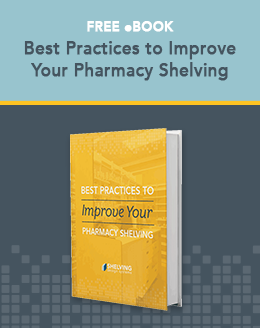 By now you should have implemented the new, more restrictive HIPAA regulations that took effect in September 2013. If you haven't and fail to do so, you could face significant fines. The future in pharmacy continues to evolve, and these and other developments, like the implementation of the Affordable Care Act, will continue to impact the industry.
By now you should have implemented the new, more restrictive HIPAA regulations that took effect in September 2013. If you haven't and fail to do so, you could face significant fines. The future in pharmacy continues to evolve, and these and other developments, like the implementation of the Affordable Care Act, will continue to impact the industry.
These new regulations more stringently protect patient privacy and personal health information. You'll implement necessary protocols to ensure those protections, and as part of that you may need to invest in some new pharmacy shelving and fixtures that will provide more security.
What do the new HIPAA regulations mean for the future in pharmacy?
These new regulations really mean one thing: stricter controls for patient privacy. In other words, patients' health information, or PHI, must now be protected explicitly. Components you must address to be in compliance with this new rule include:
- New requirements for patients' information access and privacy
Patients now have the right to restrict who sees their personal health information, and they must have access to their own files. If health professionals should need access to these files for patients or for other allowable reasons, privacy requirements still allow this.
- Reporting of all security breaches
Under the new regulations, you must notify the Department of Health and Human Services if ANY breach occurs, unless disclosure of PHI is allowable under the privacy rule. Subcontractors and business associates will need to sign agreements that will be updated on a regular basis, and they must also comply with the HIPAA security rules.
- Implementing physical safeguards for PHI and tightly securing devices
- Restricting access to PHI
In addition, secure authentication and strict login procedures and protocols must be used to further protect PHI through carefully controlled and restricted access. Other changes to restrict access include centralized workstations and protocols implemented to eliminate, reduce, or use components that store PHI.
How can pharmacy shelving upgrades help you comply with HIPAA regulations?
- Secure fixtures can help you protect patient health information
These new HIPAA regulations are a permanent part of the future in pharmacy, so it's worth investing in any new pharmacy fixtures that will protect PHI. Some of these include:
- Components for centralized workstations
With workstations now required to be centralized so that it's simpler to strictly control personnel access, you may need to designate an area for that specific use.
Centralized workstations are important because they allow for careful monitoring at all times. It's much more difficult to either deliberately or accidentally cause a breach without being noticed. In addition, authenticated logins provide another layer of protection for patients' privacy and PHI access.
Privacy protections are a major concern now and for the future in pharmacy, thanks to HIPAA regulations that went into effect in September 2013. Fortunately, simple upgrades to your pharmacy workspace can help you create strictly controlled centralized workstations, and can also allow you to securely lock away any portable devices used to access PHI when not in use.




